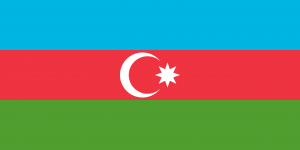Difference between revisions of "Language/North-azerbaijani/Culture/Religion-in-North-Azerbaijan"
m (Quick edit) |
m (Quick edit) |
||
| Line 2: | Line 2: | ||
{{North-azerbaijani-Page-Top}} | {{North-azerbaijani-Page-Top}} | ||
<div class="pg_page_title">North Azerbaijani | <div class="pg_page_title">[[Language/North-azerbaijani|North Azerbaijani]] → [[Language/North-azerbaijani/Culture|Culture]] → Religion in North Azerbaijan</div> | ||
__TOC__ | __TOC__ | ||
| Line 48: | Line 48: | ||
{{#seo: | {{#seo: | ||
|title=North Azerbaijani Culture | |title=North Azerbaijani Culture - Religion in North Azerbaijan | ||
|keywords=North Azerbaijani religion, Islam, Shia, Sunni, Christian, Armenian Apostolic, Judaism, cultural traditions, religious practices | |keywords=North Azerbaijani religion, Islam, Shia, Sunni, Christian, Armenian Apostolic, Judaism, cultural traditions, religious practices | ||
|description=Learn about the role of religion in North Azerbaijani culture, including the practices of Islam, Christianity, and Judaism, and how they have shaped the traditions and values of the region's diverse communities. | |description=Learn about the role of religion in North Azerbaijani culture, including the practices of Islam, Christianity, and Judaism, and how they have shaped the traditions and values of the region's diverse communities. | ||
}} | }} | ||
| Line 74: | Line 74: | ||
{{North-azerbaijani-Page-Bottom}} | {{North-azerbaijani-Page-Bottom}} | ||
<span maj></span> <span gpt></span> <span model=gpt-3.5-turbo></span> | |||
Revision as of 20:45, 18 March 2023
Religion plays a significant role in the culture and traditions of the North Azerbaijani people. The vast majority of North Azerbaijani people are Muslim, with a smaller number of Christians, Jews, and followers of other religions. In this lesson, we will explore the role of religion in North Azerbaijani traditions and culture, and learn about the different faiths and religious practices of the region's diverse communities.
Religion in North Azerbaijani culture
Religion is an integral part of North Azerbaijani culture, and has shaped many aspects of its traditions and values. The region's religious diversity is a reflection of its complex history and geography, which have been marked by the influence of many different empires and cultures over the centuries.
The major religion in North Azerbaijan is Islam, which is practiced by the vast majority of the population. Sunni Islam is the predominant sect in the country, but Shiite and Sufi communities also play important roles in the religious life of the region. Many North Azerbaijani people identify strongly with their Islamic faith, and integrate religious practices into their daily lives.
In addition to Islam, there are also smaller communities of Christians and Jews in North Azerbaijan. The Armenian Apostolic Church is the largest Christian denomination in the country, followed by the Russian Orthodox Church and the Georgian Orthodox Church. There is also a small population of Jews in North Azerbaijan, who have their own synagogues and cultural institutions.
While the North Azerbaijani government officially supports religious freedom and tolerance, tensions between different religious groups have sometimes arisen in the region. In particular, conflicts between Muslims and Christians have occurred in some areas. However, many North Azerbaijani people pride themselves on their tradition of religious tolerance and mutual respect, and work hard to maintain peaceful relations with their neighbors of different faiths.
Islamic traditions in North Azerbaijan
As mentioned earlier, Islam is the dominant religion in North Azerbaijan, and its traditions and practices are deeply embedded in the culture of the region. Here are some key aspects of Islamic practice in North Azerbaijan:
- Prayer: Muslims in North Azerbaijan are expected to pray five times a day, facing towards Mecca. This practice is an essential element of Islamic faith, and is considered a means of strengthening one's connection with Allah.
- Fasting: During the holy month of Ramadan, Muslims in North Azerbaijan observe a period of fasting and spiritual reflection. This involves abstaining from food and drink during daylight hours, as well as engaging in extra prayers and charitable acts.
- Pilgrimage: One of the five pillars of Islam is the Hajj, or pilgrimage to Mecca. While not all North Azerbaijani Muslims are able to make this journey, many aspire to do so at some point in their lives.
- Zakat: Another pillar of Islam is the obligation to give to charity, or zakat. Muslims in North Azerbaijan are expected to share a portion of their wealth with those in need, whether through donations to charity organizations or direct giving to individuals.
Christian and Jewish traditions in North Azerbaijan
While Islam is the dominant religion in North Azerbaijan, there are also significant communities of Christians and Jews in the region. Here are some key aspects of these faiths' practices in North Azerbaijan:
- Christian traditions: The Armenian Apostolic Church is the largest Christian denomination in North Azerbaijan. Followers of this church celebrate a range of religious holidays, including Christmas, Easter, and the Epiphany. The Russian Orthodox Church and the Georgian Orthodox Church also have small but active communities in the region.
- Jewish traditions: The Jewish community in North Azerbaijan is small, but vibrant. There are a number of synagogues in the region, as well as Jewish cultural centers and schools. Jews in North Azerbaijan celebrate traditional holidays such as Hanukkah, Passover, and Yom Kippur.
Conclusion
Religion is an important aspect of North Azerbaijani culture, and has played a significant role in shaping its traditions and values over the centuries. Understanding the different religious communities and practices in the region is essential for anyone seeking to fully appreciate the richness and diversity of North Azerbaijani culture. Whether you are a student of history, a traveler, a businessperson, or simply someone who loves learning about new cultures, exploring the religious traditions of North Azerbaijan is sure to be a fascinating and rewarding experience.
Sources
